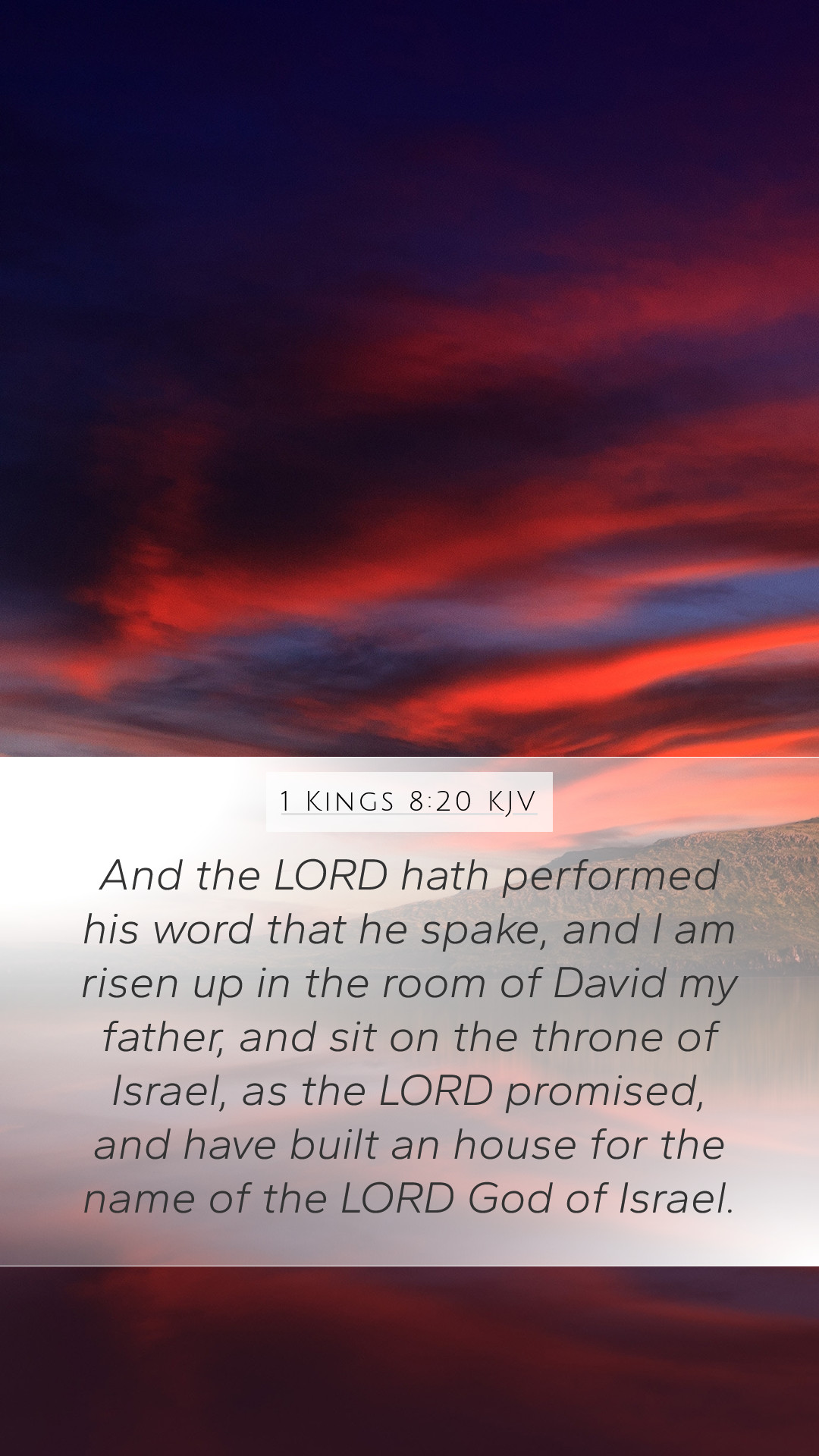Understanding 1 Kings 8:20
Verse Reference: 1 Kings 8:20 - “And the LORD hath performed His word that He spake, and I am risen up in the room of David my father, and sit on the throne of Israel, as the LORD promised, and have built a house for the name of the LORD God of Israel.”
Overview of the Verse
This verse is part of Solomon's prayer of dedication for the temple he built in Jerusalem. It reflects on God's faithfulness to His promises, particularly regarding the throne of David and the establishment of the temple as a house of worship. It signifies a transition in leadership as Solomon acknowledges his role in fulfilling God's promises.
Bible Verse Meanings
1 Kings 8:20 emphasizes several important themes that relate to God's promises and the fulfillment of those promises through human agency.
- Divine Fulfillment: The phrase "the LORD hath performed His word" highlights God's faithfulness. This reinforces the concept that God keeps His promises, which serves as a foundational truth in biblical theology.
- Promise of Kingship: Solomon's acknowledgment that he has taken the throne in place of his father David illustrates the continuity of God’s promise to David regarding his lineage (2 Samuel 7:12-16).
- Construction of the Temple: Solomon's declaration of building a temple signifies the establishment of a central place of worship, which enhances the communal worship experience of the Israelites and demonstrates obedience to God's command.
Bible Verse Interpretations
Commentators such as Matthew Henry, Albert Barnes, and Adam Clarke provide insightful interpretations of this verse:
- Matthew Henry: He emphasizes the assurance that God gives to Solomon about fulfilling His covenant with David, ensuring that Solomon confirms this faithfulness in his prayer. Henry notes that Solomon’s role in building the temple is not just a personal ambition but a divine mandate.
- Albert Barnes: He highlights the significance of Solomon’s acknowledgment of God's faithfulness and the resultant blessing upon the nation of Israel. Barnes explains that Solomon’s success and the establishment of the temple are pivotal moments in Israel's history, contributing to the nation’s identity and relationship with God.
- Adam Clarke: His commentary details the historical context, illustrating how the fulfillment of God's promise to David is integral to the narrative of Israel's monarchy. Clarke connects the temple's construction with themes of devotion and national identity, signifying a crucial point in the establishment of Israel's worship architecture.
In-depth Bible Verse Analysis
As we explore 1 Kings 8:20, we can apply various interpretive lenses, including historical, theological, and practical applications:
Historical Context
The moment of Solomon’s assertion underscores a critical period in Israel's history. Following King David, Solomon's reign represented stability and the consolidation of Israel’s power. The construction of the temple marked a pivotal shift from a nomadic or tent-based worship experience to a settled, permanent place of worship.
Theological Insights
Theologically, this verse touches upon the covenantal nature of God, reinforcing that His promises extend beyond individual lives to collective blessings for the nation. This interconnectedness of divine promise and human responsibility calls believers to recognize their roles in God’s plans.
Practical Application
On a practical level, this verse encourages believers today to trust in God’s faithfulness and to actively participate in the plans He has for their lives. Just as Solomon was called to lead, Christians are called to serve and build within their communities, fostering worship and collective identity.
Additional Biblical Cross References
- 2 Samuel 7:12-16 - God’s covenant with David regarding his lineage and kingship.
- 1 Chronicles 28:6-7 - God’s promise to David regarding Solomon's kingship and temple construction.
- Deuteronomy 12:10-11 - Instructions on worshiping in the designated place that the Lord will choose.
- Psalm 132:11-14 - A reflection on God’s promise to David and the significance of Zion.
- Hebrews 8:1-2 - A New Testament reflection on Jesus as the mediator of a better covenant.
Conclusion
1 Kings 8:20 serves as a profound reminder of the faithfulness of God in fulfilling His promises throughout Scripture. Through Solomon's acknowledgment of God’s character and his role in the broader narrative of Israel, believers are encouraged to trust God’s plans and to engage actively in a life of worship and service. The lessons learned from this verse not only apply to the ancient Israelites but remain relevant for modern believers, emphasizing the continuity of God's work through the ages.


